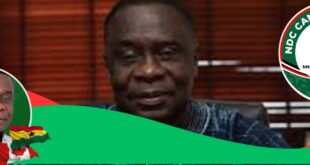Boris Johnson has promised to deliver Brexit and repay the trust of voters after he led the Conservatives to an “historic” general election win.
The prime minister – who has met the Queen to ask to form a new government – has a House of Commons majority of 78, with one seat still to declare.
He said he would work “flat out” and lead a “people’s government”.
Jeremy Corbyn said he would not fight another election as Labour leader, amid recriminations over the party’s defeat.
He said he was “very sad” about the result, adding that he had received “more personal abuse” from the media during the campaign than any previous prime ministerial candidate.
Labour was swept aside by the Conservatives in its traditional heartlands in the Midlands and north-eastern England, and lost six seats in Wales.
With just one constituency – St Ives, in Cornwall – left to declare, the Conservatives have 364 MPs, Labour 203, the SNP 48, Liberal Democrats 11 and the DUP eight.
Sinn Fein has seven MPs, Plaid Cymru four and the SDLP has two. The Green Party and Alliance Party have one each.
The Brexit Party – which triumphed in the summer’s European Parliament elections – failed to win any Westminster seats.
The Conservative Party’s Commons majority is its largest since Margaret Thatcher won a third term in 1987.
Mr Johnson has returned to Downing Street, having visited Buckingham Palace, and is expected to make a statement outside Number 10 this afternoon.
In his victory speech earlier, he told activists the election result represented a “new dawn” for the country. He thanked Labour voters, many of whom, he said, had backed the Conservatives for the first time, vowing to fulfil the “sacred trust” placed in him.
“You may intend to return to Labour next time round, and if that is the case, I am humbled that you have put your trust in me, and I will never take your support for granted,” he said.
- WHO WON IN MY CONSTITUENCY? Check your result
- NATIONAL PICTURE: The result in full
- ALL YOU NEED TO KNOW: The night’s key points
- MAPS AND CHARTS: The election in graphics
- BREXIT: What happens now?
- IN PICTURES: Binface, a baby and Boris Johnson
Mr Johnson said the Conservatives’ victory had “smashed the roadblock” in Parliament over Brexit and put an end to the “miserable threats” of another referendum on Europe.
He said: “We will get Brexit done on time by 31 January – no ifs, no buts, not maybe.”
Johnson’s gamble pays off
The same prime minister. But a new map.
A victory bigger than the Tories, haunted by 2017, had dreamt of. As the hours ticked by, red flipped to blue, familiar faces forced out of their seats.
Boris Johnson gambled that he could win an election with support from towns and communities where voting Conservative might almost have seemed a sin.
And he won.
The Conservatives’ majority will have an almost immediate effect on the country – unless something strange happens we will leave the European Union next month because behind him on the green benches will be new Tory MPs who will vote through his Brexit bill, his position strong enough to subdue any opposition.
At 33%, Labour’s share of the vote is down around eight points on the 2017 general election and is lower than that achieved by former leader Neil Kinnock in 1992.
Some traditional Labour constituencies, such as Darlington, Sedgefield and Workington, in the north of England, will have a Conservative MP for the first time in decades – or, in the case of Bishop Auckland and Blyth Valley, for the first time since the seat was created.
Mr Corbyn said his party had put forward a “manifesto of hope” but “Brexit has so polarised debate it has overridden so much of normal political debate”.
The BBC’s Iain Watson said he understood Mr Corbyn wanted to stay on for a “few more months” but he could face “sustained pressure” to go sooner.
Some within Labour have blamed the party’s support for another Brexit referendum and the long-running anti-Semitism row for the election result.
Labour chairman Ian Lavery said he was “desperately disappointed”.
Jo Swinson has quit as Liberal Democrat leader after losing her Dunbartonshire East seat to the SNP by 149 votes.
While she admitted her “unapologetic” pro-Remain strategy had not worked, she said she did not regret standing up for her “liberal values” and urged the party to “regroup and refresh” itself in the face of a “nationalist surge” in British politics.
In other developments:
- Sir Ed Davey and Lib Dem president Sal Brinton are taking over as interim leaders of the Lib Dems
- The Lib Dems took Richmond Park, in south-west London, from Conservative minister Zac Goldsmith, but high-profile former Tory and Labour recruits Chuka Umunna, Luciana Berger and Sam Gyimah all fell short
- Nigel Dodds, the leader of the Democratic Unionist Party at Westminster, lost his Belfast North seat to Sinn Fein
- Labour’s Caroline Flint – who backed the Tory Brexit deal in defiance of her party – and the party’s longest-serving MP, Dennis Skinner, were among high-profile opposition figures to be defeated
- Remain-backing former Tory minister Dominic Grieve came second to the Conservative candidate in Beaconsfield
- Anna Soubry, who quit the Tories to form a pro-Remain group of MPs, lost her Nottinghamshire seat to the Tories, as did the other members of The Independent Group for Change
- Nigel Farage said his Brexit Party had taken votes from Labour in Tory target seats, although he himself had spoiled his ballot paper “as I could not bring myself to vote Conservative”.
Scottish National Party leader and Scotland’s First Minister Nicola Sturgeon said it had been an “exceptional” result for her party.
She said Scotland had sent a “very clear message” that it did not want a Boris Johnson Conservative government and the prime minister did not have a mandate to take Scotland out of the EU.
It was also a “strong endorsement” for Scotland having a choice over its own future in another independence referendum, she added.
US President Donald Trump congratulated Mr Johnson on a “great win” and the EU’s top official, Charles Michel said he hoped Parliament would approve the Brexit withdrawal treaty agreed in October as “soon as possible”.
The legislation paving the way for Brexit on 31 January is due to come before the new Parliament for the first time next Friday.
There is expected to be a minor cabinet reshuffle on Monday, to fill vacant positions such as Welsh and culture secretaries.
A more thorough reshaping is likely to be put on hold until February, after the UK has left the EU, with a Budget statement in March.
BBC
 Home Of Ghana News Ghana News, Entertainment And More
Home Of Ghana News Ghana News, Entertainment And More





